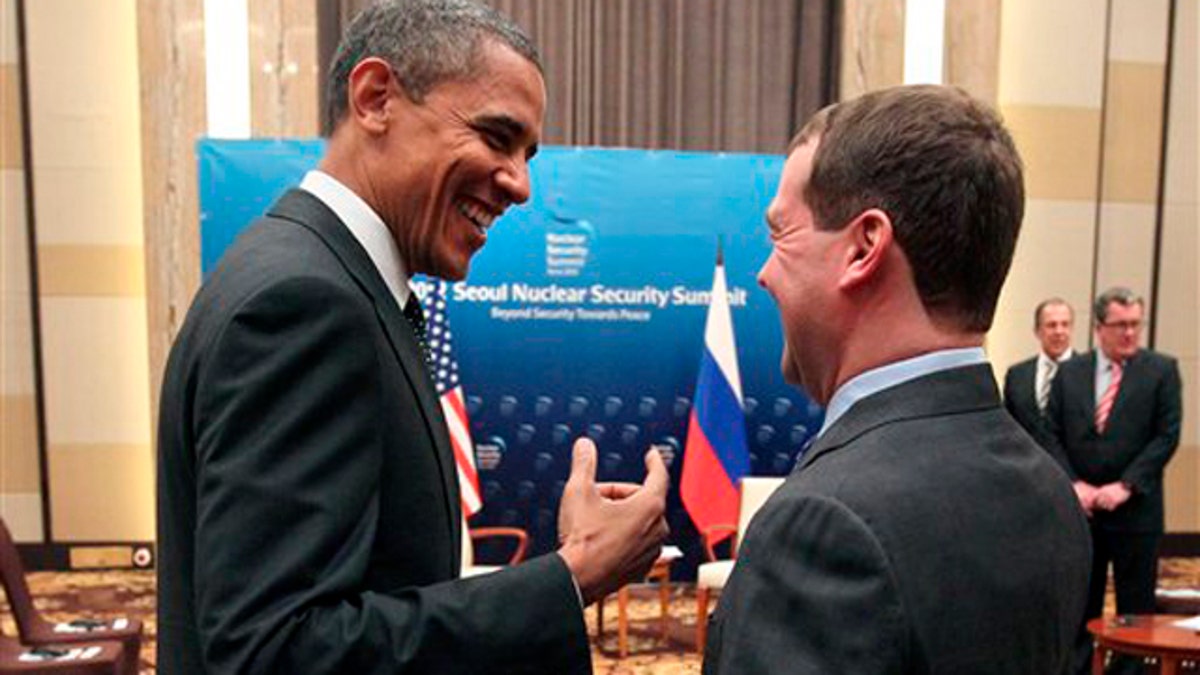
President Obama and Russian President Dmitry Medvedev talk following the conclusion of their bilateral meeting at the Nuclear Security Summit in Seoul, South Korea. (AP)
Republicans are pressing President Obama to clarify what he meant when he told Russian President Dmitry Medvedev he'd have "more flexibility" on missile defense after the November election.
The brief exchange between Obama and Medvedev during a sit-down in Seoul quickly spread around the world Monday, after a Russian journalist recorded it and shared the tape with the producer assigned to cover the event for other networks.
The remarks by Obama were open to interpretation. But while the White House downplayed them, prominent Republicans seized on them as a sign Obama was leaving some plan unspoken.
GOP presidential candidate Mitt Romney said the comments were "alarming and troubling."
House Speaker John Boehner tweeted that when the president returns, "we look forward to hearing what he meant by having 'more flexibility' on missile defense."
In the recording, according to the pool producer who heard it, Obama told Medvedev: "This is my last election. After my election, I have more flexibility."
Obama appeared to be asking Medvedev to relay this point to Vladimir Putin, who recently won election to return to the Russian presidency.
"On all these issues, but particularly missile defense ... this can be solved but it's important for him to give me space," Obama said.
Medvedev told the president he understood the "message about space. Space for you ..."
After Obama noted he'd have more flexibility in the future, Medvedev told him: "I understand. I will transmit this information to Vladimir."
U.S.-backed plans for a missile defense shield in Europe have been a sensitive subject in Russia, one that Putin exploited during his presidential campaign.
The White House downplayed the conversation between Obama and Medvedev.
Ben Rhodes, deputy national security adviser for strategic communications, said the U.S. is "committed" to implementing the missile defense system, "which we've repeatedly said is not aimed at Russia."
"However, given the longstanding difference between the U.S. and Russia on this issue, it will take time and technical work before we can try to reach an agreement," he said in a written statement.
"Since 2012 is an election year in both countries, with an election and leadership transition in Russia and an election in the United States, it is clearly not a year in which we are going to achieve a breakthrough. Therefore, President Obama and President Medvedev agreed that it was best to instruct our technical experts to do the work of better understanding our respective positions, providing space for continued discussions on missile defense cooperation going forward."
Early in Obama's presidency, Republicans cried foul when he pulled back on plans for a missile defense system in Poland and the Czech Republic.
Senate Republican Whip Jon Kyl revived those concerns Monday following Obama's comment.
"We know the president cancelled plans to station an anti-ballistic missile system in Poland and the Czech Republic," Kyl said in a statement, going on to criticize the president for "sharing information with Russia" and "undermining our ability to effectively intercept long-range ballistic missiles."
"But what we don't know," Kyl said, "is what President Obama has in mind for after the election, when he would gain some 'flexibility' in negotiating with the Russians. Perhaps the Russians, in whom President Obama recently confided, could shed some light on his missile defense plans for the American people who otherwise have been left in the dark by this president."












































